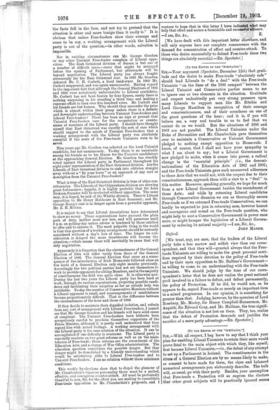[TO THE EDITOR OF TRH "SPECTATOR:1 Sin,—Your argument (Spectator, December
12th) that grati- tude and the desire to make Free-trade " absolutely safe" should lead Liberals to "do a deal" with the Free-trade Unionists " on the lines of the 18S6 compact" between the Liberal Unionist and Conservative parties seems to me to ignore one or two elements in the situation. Gratitude and respect undoubtedly put very strong pressure upon many Liberals to support men like Mr. Ritchie and Lord George Hamilton in recognition of their courage and conscientiousness, and of their soundness on one of the great questions of the hour ; and it is, if you will believe me, a very real trouble to us to feel that we cannot do as we would. But the situations of 1886 and 1903 are not parallel. The Liberal Unionists under the Duke of Devonshire and Mr. Chamberlain gave themselves over to maintain a Conservative or Unionist Government pledged to nothing except opposition to Home-rule. I know, of course, that I shall not have your sympathy in what I am about to say; but a Liberal Government is now pledged to make, when it comes into power, a radical change in the " essential principle " (i.e., the denomi- nationalism) of the Education Acts of 1902 and 1903; and the Free-trade Unionists gave such unreserved adherence to those Acts that we could not, with the respect due to their conscientiousness, approach them with a view to a " deal " in this matter. Moreover, speaking generally, we hope for much from a new Liberal Government besides the amendment of those Acts ; and while by returning Liberal candidates through Conservative disunion we can as thoroughly secure Free-trade as if we returned Free-trade Conservatives, we can hardly be expected to join in returning men, however honest and courageous and sound on the Free-trade question, who might help to seat a Conservative Government in power once more, or might hamper the legislation of a Liberal Govern- ment by reducing its natural majority.—I am, Sir, &c., [We trust, nay, are sure, that the leaders of the Liberal party take a less narrow and selfish view than our corre- spondent, and that they will—granted always that the Free- trade Unionists are willing to make the great personal sacri- fices required by their devotion to the policy of Free-trade and by their open opposition to Mr. Balfour's Government— be willing to come to an understanding with the Free-trade Unionists. We should judge by the tone of our corre- spondent's letter that he does not realise the great national peril involved in a failure to defeat, and defeat permanently, the policy of Protection. If he did, he would not, as he appears to do, regard Free-trade as merely an important item in a mixed programme. In our opinion, it is something far greater than that. Judging, however, by the speeches of Lord Rosebery, Mr. Morley, Sir Henry Campbell-Bannerman, Mr. Asquith, Sir Edward Grey,. and Mr. Haldane, the true signifi- cance of the situation is not lost on them. They, too, realise that the defeat of Protection demands and justifies the sacrifice of a mere party advantage.—En. Spectator.]


















































 Previous page
Previous page